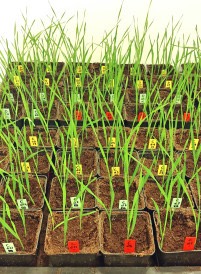
Room: 501 (Bioturm)
Tel office: +49 431 880 6364
Tel lab: +49 431 880 6360
Email: hseybold@bot.uni-kiel.de

Research interests
The immune system of living organisms is one of natures amazing inventions – and so are the strategies of pathogens to overcome it. Ever since I heard about the immune system of plants and the strategies of plant pathogens to outwit these barriers I was fascinated and wanted to learn more about it.
In the Stukenbrock lab I am studying the responses of wheat (Triticum aestivum) to infection by the specialized wheat pathogen Zymoseptoria tritici as well as unspecialized plant pathogens using phenotypic as well as molecular and biochemical assays. My approach involves wheat cultivars of differential susceptibilities and different fungal and bacterial pathogen isolates and mutant strains, giving me the opportunity to look deeper into the underlying mechanisms of infection also on a genetic level.
Short CV
2016 – present
University Kiel (Germany), PostDoc in the group of Eva Stukenbrock (Environmental Genomics)
2014 – 2016
Free University Berlin (Germany), PostDoc in the group of Tina Romeis (Plant Biochemistry)
2010-2014
Free University Berlin (Germany), PhD student in the group of Tina Romeis (Plant Biochemistry)
2009
3 months internship at the Weizmann Institute of Science (Rehovot, Israel) in the group of Asaph Aharoni (Plant Metabolomics)
2004-2010
University Tübingen (Germany), Diploma in Biochemistry
Diploma Thesis in the group of Birgit Kemmerling/Thorsten Nürnberger (Plant Biochemistry)
Publications
Interactions and Coadaptation in Plant Metaorganisms. Hassani MA, Özkurt E, Seybold H, Dagan T, Stukenbrock EH. Annu Rev Phytopathol. 2019 Jul 26. doi: 10.1146/annurev-phyto-082718-100008
Nutzpflanzen nachhaltig vor Krankheiten schützen? Seybold H, Haueisen J, Stukenbrock EH. 2019. BIOspektrum doi: 10.1007/s12268-019-1037-7
Highly flexible infection programs in a fungal plant pathogen. Haueisen J, Moeller M, Eschenbrenner CJ, Grandaubert J, Seybold H, Adamiak H, Stukenbrock EH. 2018. Evolution and Ecology. 1–20. doi:10.1002/ece3.4724.
CDPK Activation in PRR Signaling. Seybold H
Ca2+ signalling in plant immune response: from pattern recognition receptors to Ca2+ decoding mechanisms. Seybold H, Trempel F, Ranf S, Scheel D, Romeis T, Lee J. New Phytol. 2014 Dec;204(4):782-90
Calcium-dependent protein kinase/NADPH oxidase activation circuit is required for rapid defense signal propagation. Dubiella U, Seybold H, Durian G, Komander E, Lassig R, Witte CP, Schulze WX, Romeis T. Proc Natl Acad Sci U S A. 2013 May 21;110(21):8744-9. doi: 10.1073/pnas.1221294110
The tyrosine-sulfated peptide receptors PSKR1 and PSY1R modify the immunity of Arabidopsis to biotrophic and necrotrophic pathogens in an antagonistic manner. Mosher S, Seybold H, Rodriguez P, Stahl M, Davies KA, Dayaratne S, Morillo SA, Wierzba M, Favery B, Keller H, Tax FE, Kemmerling B. Plant J. 2013 Feb;73(3):469-82. doi: 10.1111/tpj.12050
TOMATO AGAMOUS-LIKE 1 is a component of the fruit ripening regulatory network. Itkin M, Seybold H, Breitel D, Rogachev I, Meir S, Aharoni A. Plant J. 2009 Dec;60(6):1081-95. doi: 10.1111/j.1365-313X.2009.04064.x